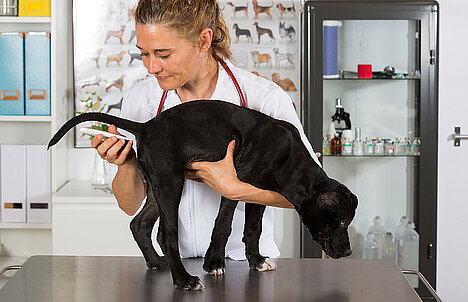Inflammatory Bowel Disease

Inflammatory Bowel Disease (IBD) is a chronic disease of the gastrointestinal tract that can cause inflammation, pain and diarrhea in dogs. The exact cause of IBD is not known, but it is thought to be an autoimmune disease in which the dog's immune system mistakenly attacks its own cells and tissues.
Symptoms of IBD in dogs
The symptoms of IBD in dogs can vary depending on the severity and the area of the gastrointestinal tract affected. The most common symptoms include:
- Chronic or recurrent diarrhea
- Weight loss
- Loss of appetite
- vomiting
- Blood or mucus in the feces
- Abdominal pain or flatulence
- Changes in the coat or skin
Diagnosis of IBD in dogs
Diagnosis of IBD in dogs requires a thorough examination by a veterinarian who will consider the medical history, clinical signs and the results of various tests. Possible tests include:
- Blood tests to rule out other diseases and measure the degree of inflammation
- Fecal examinations to identify parasites, bacteria or fungi
- X-rays or ultrasound to assess the structure and function of the gastrointestinal tract
- Endoscopy or biopsy to take tissue samples from the gastrointestinal tract and examine them under a microscope
Treatment of IBD in dogs
Treatment of IBD in dogs aims to reduce inflammation, relieve symptoms and regulate the immune system. Treatment can vary depending on the severity and cause of IBD, but it usually includes:
- A special diet that is easy to digest and contains no allergens or irritants
- Medication, such as anti-inflammatory or immune suppressants, antibiotics or probiotics
- Nutritional supplements, such as omega-3 fatty acids, vitamins or minerals
- Fluid and electrolyte therapy to prevent dehydration and electrolyte imbalances
- Surgery, in rare cases when part of the gastrointestinal tract needs to be removed
Prognosis and prevention of IBD in dogs
The prognosis of IBD in dogs depends on several factors, such as the severity of the disease, responsiveness to treatment and the presence of complications. Some dogs can lead a normal life with appropriate treatment, while others may have a chronic course. Prevention of IBD in dogs is not always possible, but some measures can reduce the risk or alleviate symptoms, such as:
- Providing a balanced and high-quality diet for the dog
- Avoiding or minimizing contact with potential allergens or irritants
- Reduce or manage stress for the dog
- Scheduling regular veterinary visits for the dog
The authors assume that a veterinarian should be consulted if an animal is ill and that medication should only be taken after consultation with a doctor or pharmacist. Only an individual examination can lead to a diagnosis and treatment decision.
We help you find the nearest vet → This way